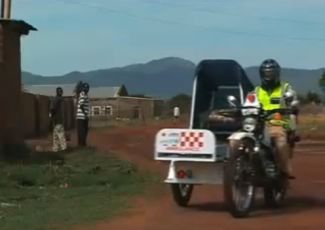UN donates alternative ambulances to Central Equatoria State
By Ngor Arol Garang
September 18, 2010 (MALAKAL)-The United Nations Children’s Fund (UNICEF) on Friday donated more than five motor bike ambulances to the government of the southern Central Equatoria State (CES) for distribution to health facilities in the territorial boundaries of the region.

“Last year, during the handing over of five alternative ambulances, we promised to donate more ambulances to the region. We promised and now we have delivered. Preventing maternal, newborn and child and deaths ranks high on our list of priorities,” said Ali.
Ali gave assurance that the United Nations (UN) is “committed to working with other partners to strengthen the health care system, so it is able to effectively deliver high quality services to the people, especially mothers and children.”
UNICEF, according to Ali, believes that the donation will make the difference between life and death when obstetric emergencies occur.
Ali commended the Government of Southern Sudan (GoSS) for its continued commitment to improving the well-being of its people, including their right to good health.
“Based on the newest UN global maternal mortality estimates released on Wednesday by the World Health Organization, UNICEF, United Nations FPA and the World Bank, while maternal deaths have globally dropped by a third, there is no room for complacency,” Ali said.
Ali commended the GoSS, saying that maternal deaths are declining, a development that showed that concerted, coordinated and renewed commitments pays off.
“If south Sudan is to meet its commitment to reduce maternal deaths, it will need to accelerate and scale up efforts, particularly those related to family planning, emergency obstetric care and skilled attendance during delivery. The significant progress made in the reduction of mortality rates in infants and those under the age of five needs also to be implemented for mothers and newborns,” Ali noted.
The new estimates, according to Ali, bring hope that efforts to reduce maternal and newborn deaths, including those related to HIV and AIDS, will now be implemented with greater impetous. Ali encouraged the GoSS to put women and children’s health at the heart of its development efforts.
Bismarck Swagin, communications officer for UNICEF in the region, told Sudan Tribune from Juba that UNICEF would continue to support the GoSS in strengthening the capacity of healthcare systems; especially in the fields of pediatrics and obstetrics.
In 2008 UNICEF donated five motorbike ambulances to the government of Eastern Equatoria State. It has donated a similar number to CES and it will donate another five to Western Equatoria State, explained Bismarck.
Emmanuel Ijja, minister of health in the CES, commended UNICEF for its donation and expressed the commitment of the state government to continued cooperation with development partners.
“The government of Central Equatoria State value, appreciate and thank UNICEF for this donation,” said Ijja in a televised statement on South Sudan TV on Friday.
Speaking on the same occasion, Alhaj Peter, Director in the Ministry of Health in CES, said that trained motorbike personnel would start work immediately.
Samson Baba, Director General for International Cooperation, in GoSS’s Ministry of Health also explained motorcycles are suitable since they are cheap, flexible and fit for the region’s roads. He also requested that the same initiative be extended to other southern states.
(ST)
